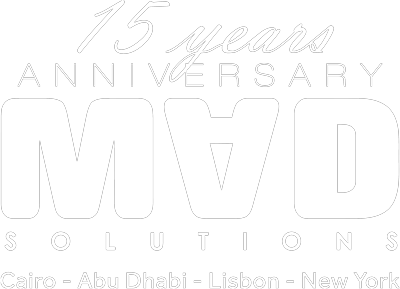release date October 19 2017
WIPO Magazine Casts Light on the Influence of MAD Solutions and the Arab Cinema Center (ACC) in the Arab World

The SCCR's (Standing Committee on Copyright and Related Rights) WIPO magazine conducted a long interview with Film Analyst Alaa Karkouti, CEO of MAD Solutions and Co-founder of the Arab Cinema Center (ACC). During the interview, Catherine Jewell, Communications Division at WIPO, shed light on MAD Solutions' efforts in promoting Arab cinema inside and outside the Arab region, as well as the Arab Cinema Center (ACC), which was founded as part of the company's strategy to develop the Arab film industry and to create a space for Arab films to be seen regionally and internationally.
Read the full interview: http://www.wipo.int/wipo_magazine/en/2017/05/article_0004.html
In the beginning Karkouti talked about what prompted him to found MAD Solutions, to become the first pan-Arab creative studio dedicated to providing integrated marketing services to the Arab film and entertainment industry, by saying, "I have always loved cinema. But when I started out, film was not considered a serious career option, so I studied journalism and began writing for Arab newspapers in London. Then I went to Cairo, the Hollywood of the Arab world, and got into film journalism. This gave me an in-depth understanding of the industry." Karkouti added, "At the time, the standard template for film distribution was a trailer, a poster and a film premiere. But it wasn't working. People were not going to the cinema. It was clear there was a gap in the Arab film market and we had to develop a new approach and to start making films that Arab audiences could relate to. To do this we needed to better understand the Arab film market and Arab audiences. That was the only way we were going to develop a cinema culture in the region. That's what prompted me to set up MAD Solutions with Maher Diab, who is now the company's Creative Director."
Karkouti pointed out that MAD Solutions aims to see the Arab film sector flourish and reach its full potential, change perceptions about Arab cinema and create the space for Arab films to be seen regionally and internationally. The company's biggest challenge is that for many in the region, cinema remains a luxury and people are generally unwilling to explore art-house films. But thankfully the landscape is changing. Last year, the company distributed 10 Arab feature films to theaters across the Arab world.
Karkouti talked about the company's activities in details, saying, "There are still so many unanswered questions about Arab Cinema, so we specialize in collecting industry data and in better understanding our target audiences. These data give us an accurate picture of the current state of the Arab film industry and its huge potential. For far too long, people have built film budgets around fake markets with no idea of the numbers. But if you are going to succeed in this business, attract investors, build credibility, and track progress, you need to understand the size of your market, and your target audience."
Karkouti brought to attention that this is the reason why MAD Solutions have been pioneering new film release strategies, such as micro-releases supported by test screenings and social media to create a buzz around a film. This approach generates useful feedback that allows the company to tailor film promotion to target audiences for maximum impact at the box office.
To give an example of promotional materials, Karkouti talked about how the company developed the promotional material for the Oscar-nominated Jordanian film Theeb, which came from feedback from cinemagoers at a test screening. Then when the company decided to launch the film in Egyptian theatres releasing it in two cinema screenings only, the producers were uneasy about this at first, but it paid off. "Those who saw the film talked about it with their friends and on social media, and generated a lot of interest in the film, which ended up staying in the cinema for seven weeks. This was exceptional as Arab cinemagoers generally favor Hollywood, Egyptian and Bollywood movies over other Arab content. Theeb has since gone on to be released in 11 countries across the region. With this approach we have won the trust of cinemas and audiences alike." Karkouti added.
This experience in understanding audiences and working with producers and film festivals around the world was the reason behind developing the company's vision in the development of the Arab film industry, which was a driving force in setting up the Arab Cinema Center (ACC). The Arab Cinema Center (ACC), which operates for the third year, is an international promotional platform for Arab cinema as it provides the filmmaking industry with a professional window to connect with their counterparts from all over the world through a number of events that it organizes. The ACC also provides networking opportunities with representatives of companies and institutions specialized in co-production and international distribution, among others.
The ACC's activities vary between film market main wings, introduction and networking sessions for Arab and foreign filmmakers, welcome parties, as well as meetings with international organizations and festivals, and the issuance of the Arab Cinema Magazine to be distributed at the leading international film festivals and markets. Furthermore, newsletter subscription is now available on the ACC's website, allowing users to obtain digital copies of the Arab Cinema Magazine, as well as news on the ACC's activities, notifications of application dates for grants, festivals and offers from educational and training institutions, updates on Arab films participating at festivals, exclusive news on the Arab Cinema LAB, and highlights from the ACC partners and their future projects.
On the challenges facing the Arab film industry, Karkouti says, "Although the quality of Arab films is improving, getting Arab audiences to see quality Arab movies remains a big challenge. Making a film that works for all Arab audiences and international cinemagoers is a big challenge. Although we share a common language, there are many dialects and many differences in humor, culture and tolerance. That is why there is growing interest in co-productions. They offer a range of benefits in terms of improving film quality and box-office returns. The region needs a sustainable film financing and distribution system supported by an investor community that recognizes the talent base as one of the region's great natural resources."
Karkouti added, "The upheavals and dramas witnessed across the Arab States in recent years have made people curious and whetted audience appetites for more stories from the region. Platforms like Netflix
and Amazon, which are relative newcomers here, are also creating additional opportunities to promote Arab films. These days, audiences are actively looking for films from different parts of the world. This is very exciting. In the past, seeing an Arab film on cinema screens outside the region was exceptional, but that is no longer the case."
The conversation moved to copyright and how important it is to the film industry. Karkouti says, "Copyright affects all aspects of our work. These rights ensure that all those involved in the process of making and distributing a film get a fair income. And the revenues they generate make it possible for filmmakers to reinvest in new film projects. Copyright really is central to the sustainability and growth of the film industry in the Arab region and beyond."
On the piracy problem that causes great loses in the industry, Karkouti says, "Piracy is a big problem and it can be difficult to get a buyer to pay a reasonable price for a film when a pirated version already exists online. But some countries are making significant progress. In the United Arab Emirates, for example, pirates now face huge fines and hefty prison sentences. However, we do need the support of policymakers to raise public awareness and build respect for IP rights across the region. Government really does have a key role to play in supporting the sustainability of the region's film industry. The success of the French, German and Moroccan film industries demonstrates what can be achieved through effective government support."
share


